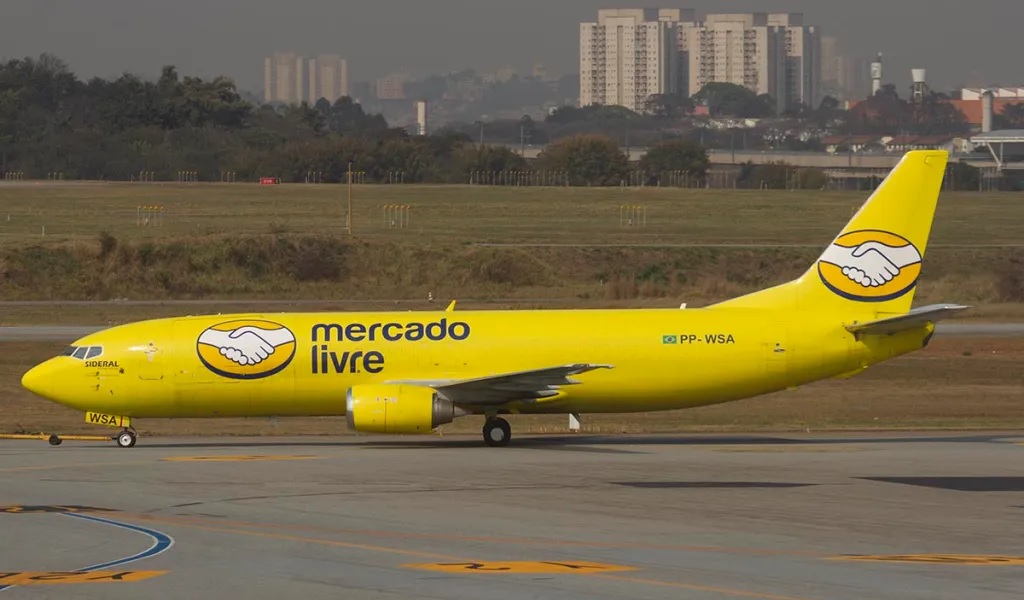RIO DE JANEIRO, BRAZIL – Mercado Libre CEO Marcos Galperin announced today that the company has entered into a 10-year agreement with airline GOL to use up to 12 of the company’s aircraft exclusively to deliver shipments in Brazil.
“The new 10-year agreement between Mercado Libre and GoOL will reduce delivery times in northern and northeastern Brazil to 48 hours and create 190 new jobs,” Galperin said on its Twitter account.
The deal includes six Gol Boeing 737-800s and is part of the R$17 billion (US$3.6 billion) investment package Mercado Libre announced for Brazil this year.

The company expects to reduce delivery times by up to 80% on longer routes, such as in the north and northeast, and by up to 50% on medium routes, such as Brazil’s Center-West. Three Gol aircraft will enter service in the second half of this year. Three more will join the fleet by the third quarter of 2023. The agreement also includes the option to operate six additional freighters by 2025.
“The expansion of the air fleet is essential for us to continue Mercado Libre’s mission to democratize e-commerce. It becomes even more latent in a country of continental dimensions like Brazil,” said Fernando Yunes, senior vice president of Mercado Libre in Brazil.
With this reinforcement, we will offer direct flights from São Paulo and reduce delivery times for the North and Northeast regions by up to 80%, reducing delivery time in Manaus, for example, from 9 days to just one day.
In the capitals of the northeast, the current delivery time of 4 days will also be reduced to one day. Consumers in Goiânia and Cuiabá, for example, will receive their packages the very next day,” said Fernando Yunes.
“We are very optimistic about our agreement with GOL and see it as a key element in strengthening our e-commerce growth and regional expansion strategy,” he added.
The aircraft destined for the operation are part of GOL’s current fleet and will be converted to freighters. They will be designated 737-800 BCFs with a capacity of 24 tons. When completed, they will carry the Mercado Libre colors and logo.
GOL Aerotech, the company’s business unit specializing in the maintenance, repair, and overhaul of aircraft and components, is obtaining certification for the full conversion of the next aircraft at its maintenance center in Confins, Minas Gerais State.
“This business model heralds a new phase for Gol and Gollog. Adding freighter operations for Mercado Libre to the scope of services offered by our logistics unit brings economies of scale and economic security to both companies in a structured and sustainable way, in addition to the market growth expected in the coming years,” said Paulo Kakinoff, CEO of Gol.
The carrier is focused on meeting the needs of Brazil’s growing e-commerce market, which currently generates more than R$180 billion in annual revenue and spends more than US$12 billion annually on logistics services.
With the exclusive operation of Mercado Libre, GOL expects to create 100 new direct jobs and approximately 90 indirect jobs.
“We expect Gollog to increase the capacity offered in tons by approximately 80% and expand the range of services offered, resulting in additional revenues of R$100 million in 2022 and more than R$1 billion over the next five years,” added Julio Perotti, chief executive officer of Gollog.
The airline remains committed to its fleet plan and will end the year with 136 aircraft, including 44 Boeing 737-MAX 8s and 92 Boeing 737-NGs. The allocation of the six aircraft exclusively to cargo operations opens a new chapter of efficiency in lowering GOL’s unit costs, as it combines with the accelerated transition of the fleet to the 737 MAX to further lower fixed costs, reduce downtime and open new opportunities to generate ancillary revenue.

